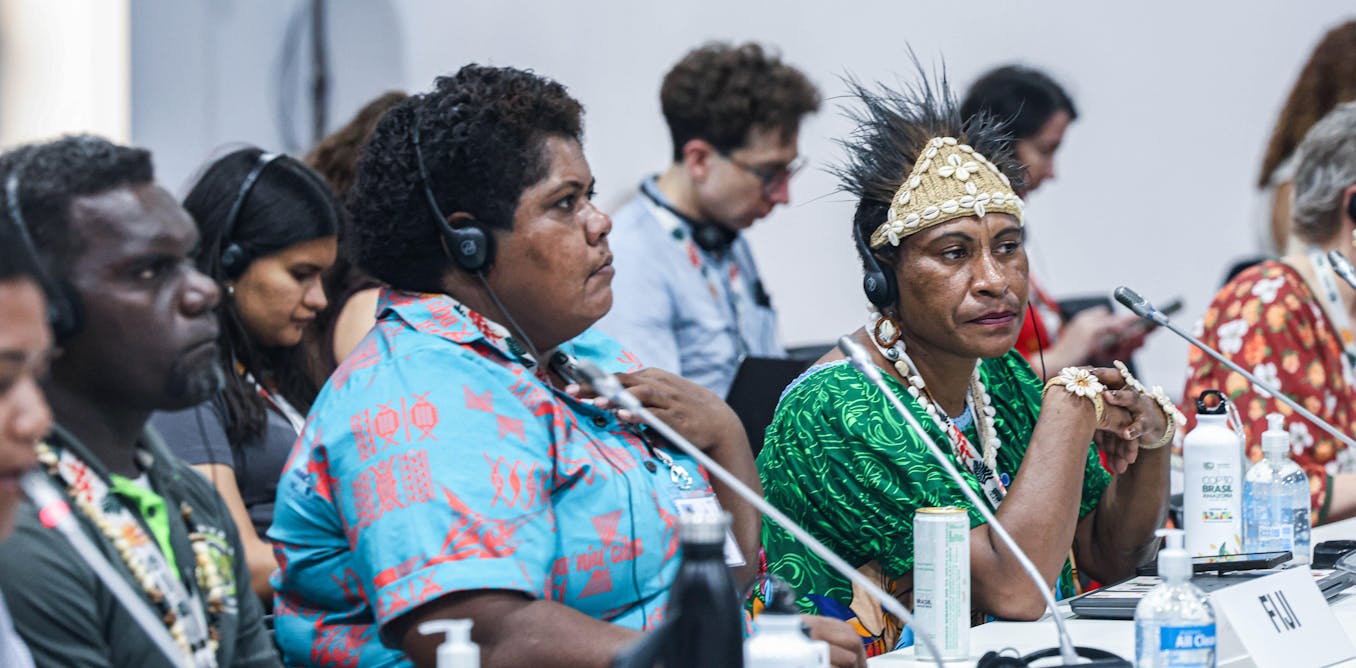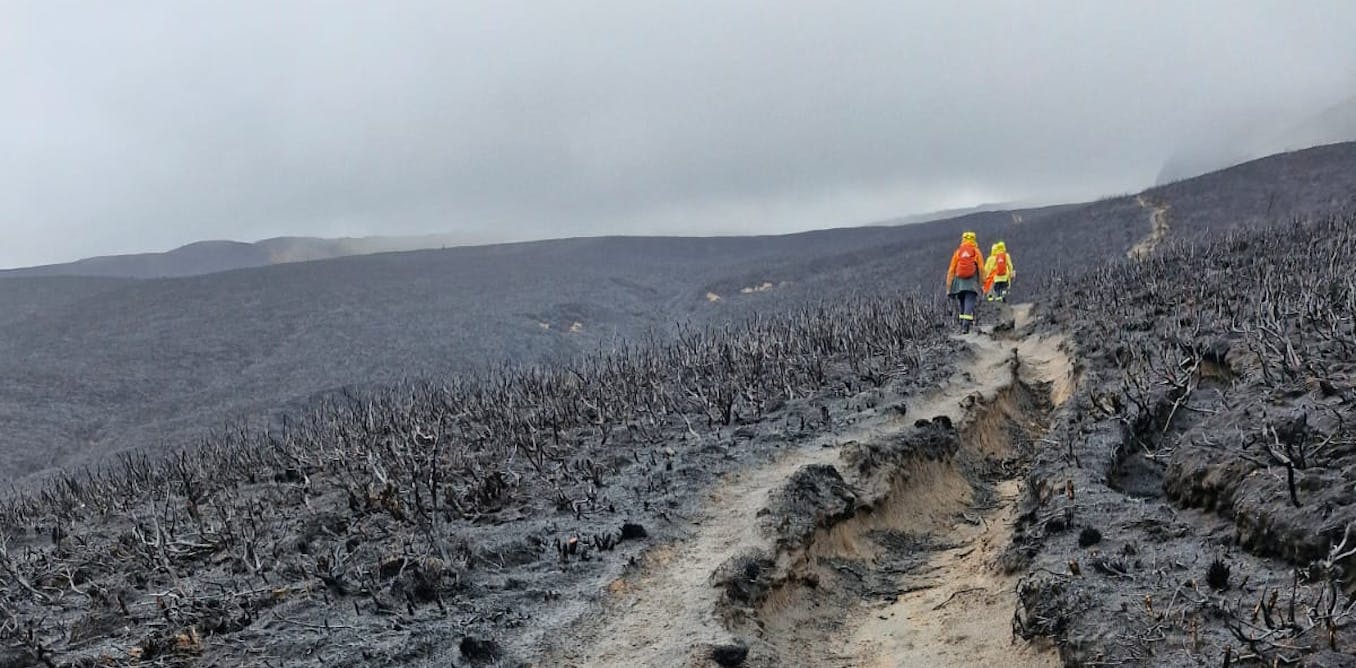In the book Silence of the Lambs, author Thomas Harris opens by describing the Behavioral Science department of Quantico — where the FBI studies serial murder — as being on the bottom floor of the building, “half-buried in the earth.” Symbolically, it establishes that the darkest behaviors of the human psyche are explored almost in a subterranean bunker, as if the floor is a pipeline to the underworld itself.
This imagery is what partially inspired In The Earth Again, the haunting collaborative album between Oklahoma City metal band Chat Pile and Texas guitarist Hayden Pedigo that dropped on Halloween. The album is bound by this post-apocalyptic vision of the earth slowly decaying into cancerous piles of waste (which thematically makes sense considering the origin of Chat Pile‘s name), where all we can do is helplessly watch our shared reality dissolve away — with no relief in sight.
“I feel like we all exist outside of reality,” Chat Pile’s lead singer Raygun Busch explains to me over Zoom. He takes intermittent breaks throughout our conversation to cuddle his dog, Goose. “Our phones have fully taken us and removed us a step from reality. This [album] is more like returning to just realizing that we are in nature and a part of an ecosystem.”
Alternatively, the way this album came together was out of neighborly and organic fondness for each other. Pedigo had moved from Amarillo, Texas, to a house in OKC and messaged the band’s Instagram page just out of fandom. The band responded quickly, and a few days after his move, Pedigo met the group at a local tiki bar. The idea came up of them working on a single together, but Chat Pile raised the stakes and offered up an album instead. The end result is one of the year’s most interesting metal releases, one that somehow perfectly balances Pedigo’s acoustic background with Chat Pile’s explosive noise rock.
Below, Chat Pile discuss Sleep Token, working with Hayden Pedigo — who only chatted with Billboard long enough to give the album’s origin story before poor cell reception ultimately doomed the call — and what it feels like to be creating metal in the “golden era of heavy music.”
How did you guys approach making this album?
Stin: The first session was kinda like, “How do we mesh our two styles together?” So I was just like, ‘Ok, everyone grab a guitar and start noodling around. We gotta find the sequence to this somehow.” Once I started hearing something working, I was like, “Ok, everybody stop! Keep doing that over and over again.”
You can hear that aspect of the album in the album’s sequencing. It sounds like you guys are just jamming out in someones garage. How did you figure out where to separate Hayden’s songs from yours?
Stin: It was kinda organic. The songs “Inside” and “Outside” come from that initial jam session, but the rest of the songs are a bit more plotted out. Hayden would come over one day and just lay a guitar track down. Then the rest of the band would stack on top of that, or the opposite would happen! Luther would have an idea and we’d track some basic stuff, then everybody in the room would figure out what to do with the track and add it together.
Tell me about the post-apocalyptic vision of the album.
Raygun: Well the title of it was actually supposed to be In the Earth but that felt a little too close to [the Chat Pile album] This Dungeon Earth, so we added “again.” It’s sort of taken from the first line of Silence of the Lambs by Thomas Harris, about Quantico being half in the earth. I wanted it to evoke being in a bunker, but also environmentalism… In terms of fear of nuclear — like, I write all the lyrics. So whatever I write about begins to take a theme.
Did writing these songs help you feel more connected to the earth and quell those scary thoughts about the state of things, or not really?
Raygun: I mean, I was just trying to make a statement. I am totally sucked into my phone like anyone else, but I try to be off of it and go outside. I like to go outside a lot. I don’t know, I don’t wanna position myself as some environmentalist. But, I don’t know, I guess I am an environmentalist. I’m very interested in transcendentalism too, like Harrison and Thoreau. I really love Annie Dillard’s books.
Does making such dark and heavy music ever take its toll on you? On songs like “The Magic of The World” and even your older music like “Why,” you are exploding with frustration and emotion the entire time.
Raygun: I feel like everyone’s afraid — and it is horrifying — we’re seeing more and more. We can actually see genocide happen on our phones every day. I look, I think you should look, but it’s a lot to take in. We’re all adults but the time for us to be like: “I don’t wanna see this I wanna enjoy my life” that s—t doesn’t…
We’re past that.
Raygun: In my opinion, y’all need to look at this stuff. Get angry about it, demand change. One way or another we need change to happen. These are U.S. bombs blowing up women and children, people, you know? I don’t know, anyway.
When you’re making music from that place then what does it do for you emotionally?
Raygun: I mean, it’s not easy but life isn’t — seeing all this stuff isn’t easy. You gotta reflect. In a way, it makes me feel good that I can reflect on this kind of stuff. I wish more artists would take it upon themselves to do…It’s just so sad that we’re one of the few bands addressing climate change or genocide or anything like that. Like, climate change is the most pressing issue! All of this other s—t is happening, but meanwhile the earth is cooking! We’re just f—king in trouble. So to me, it doesn’t help me necessarily, but I’d be remiss to not express these view points, especially when so few are. People are listening right now, but I’m gonna do it even if they aren’t.
Tell me more about that. What are your thoughts on the state of metal and the lack of artists not speaking out about this stuff? Why are we at this point?
Stin: I still think there’s plenty of punk and hardcore music addressing that kind of thing, even in the metal world there are more underground bands that seem to be addressing that as well. But I definitely think it’s cooked into the artier side of the metal world, but I think the problem is there’s this monolithic corporate metal that — I’m so detached from it, I’m only half aware of what’s going on in that world — but that seems to be where nothing is being said. It just seems to be this suburban, white, lifestyle music.
It’s just for guys to work out to and stuff — but this isn’t a problem just for now! For the most part, this has been the history of popular music. Most people don’t wanna be confronted by any type of reality of negativity, they want music to be passive entertainment. The ’80s and ’90s, you had U2 and Rage Against the Machine, but for the most part corporatized mainstream music has no interest in addressing that type of stuff. I think if they did, they’d do it in such a ham-fisted and terrible way that the messaging would be all wrong anyway.
Rock music did have a moment on the charts this year with Sleep Token and Ghost topping the Billboard 200 albums chart. Both bands also nabbed Grammy nominations. That kind of mainstream crossover is inherently exciting, right? Curious what your thoughts on this?
Stin: I mean, I think something important to keep in mind is mainstream metal is always going to be its own thing. So getting mad about the quality of Sleep Token and the quality of Ghost or whatever, and people get really mad about it, but it’s whatever. I’m happy that there’s just guitar music that’s popular in some way, so that’s kind of a positive. I just think it’s not really worth anyone’s time who’s into heavy music to be upset about that type of thing being popular.
Luther: There’s just so much stuff coming out that’s good.
Stin: Like, if you scratch slightly below the surface there’s endless amounts of some of the most forward thinking, incredible heavy music being made. It’s impossible for me to keep up — and I got my head firmly in that world. So what on the surface feels like kinda a shallow time, because of some of these bands that have risen to the top — I think in 10 years people are gonna look back at this time and see it kinda like a golden era of heavy music, once all these lost classics start bubbling up from the underground. There’s so much right now.
Why do you think all this unique metal is coming out now?
Stin: We just kinda live in a time where genre-wise and musically speaking there just aren’t any rules anymore. You can do whatever you want. It’s not like in the ’80s, where if you put an acoustic guitar on your record, you’re not metal anymore. Because of technology, it’s democratized the ability to make music, too — so I think in those two regards you’re seeing hyper-fast evolution of heavy music happening. It’s a combination of technology and freedom.
Luther: The technology side of it has made it where, I don’t know, like a band like us. Maybe we’re not able to be a full time band 20 years ago, but we are able to now. Even if we’re not gonna be the biggest metal band, it felt like you really had to break through in the ’80s and ’90s to have a career. Now that people can find their niches, there’s now all these pockets of stuff. We’re not gonna be a Sleep Token band, and I don’t even know if this type of music can be that popular, but for mainstream music in general it’s also just a whole other thing. When you’re independent — like, we’re not making video content. It’s a whole other world.
Stin: Those bands operate in a world that would be so foreign to us, in terms of how we approach art and the end goal of our music. It’s like, comparing Sleep Token to Chat Pile — it’s just too much of a difference of what those two acts are trying to achieve.
Yeah, I mean regardless of how you feel about Sleep Token, the band’s sound is a lot cleaner and crisper since signing with a major label. It’s undeniable that mainstream acknowledgement just has a way of seeping into heavy music. But on the other hand, Sleep Token are incredibly successful, which is great for them.
Stin: I mean it’s good for that one dude who’s in it.
Luther: Yeah, I mean when we started this band we played music for fun and to be fulfilled. We never started this band to become successful or quit our jobs or anything like that. That’s all happened just cause it kinda snowballed. We weren’t trying to go viral online or anything, where I feel like for a lot of bands that is the goal! And I understand that. That’s good for a lot of people to be determined, but I’m from Oklahoma City, man! That’s not a reality. I’m a highschool drop-out, I worked a s—y job. I liked my life, but yeah.
Stin: You can hear it in the music of the bands that do that though. The kind of careerist and insincere quality of it just immediately seeps through. It’s such a turn off for me. Some people either don’t notice, or they’re more interested in the pastiche of whatever these people are making. But for me, I hear it immediately and it’s like poison to me.
Luther: Like, look, if you’re trying to do art full time, I get it. But the reason our band is our band and we sound the way we sound is cause we didn’t start this from a place of wanting to do this for our jobs. We started it cause it’s fun to jam with your friends… We’re gonna definitely have a different sound and perspective with that then these bigger modern metal bands. A lot of it is very meticulously crafted and stuff, like we try our hardest, but there’s just —
Stin: We’re not catering to an audience.
Luther: We’re just writing what we wanna write, for better or for worse.
How does the reality of being a full-time band measure up to the dream of it?
Stin: Really it’s kinda exactly the same, but the one difference is that there are deadlines that dictate your life. But that’s kinda true of any job to a certain degree.
Luther: On the other hand, we have so much time to work on it. Like we wrote God’s Country when we had day jobs. It took us months and months of working on it an hour or two at a time after work, or when we can. Now we simply have more days and hours to throw at it. So now even though we have deadlines, we have more time within those deadlines to work on stuff. So it’s definitely a luxury you don’t really get unless you’re doing it full time. Like after this call, I’m going over there and we’re gonna work on some stuff. Definitely having more time has helped, but also it’s for better or worse. It’s easy to sit here, play video games and smoke pot all day, which I do end up doing a lot.
So keeping all this in mind, what does success look like for Chat Pile?
Raygun: As far as success goes, you’re looking at it. This is with Billboard, right?
Luther: Yeah, talking with you. Doing this in the middle of a Friday and not having to go to my job after this.
Stin: [Success looks like] us geeking out in middle class existence just doing music full time. I mean that’s really what it comes down to. Maybe finding a way to have cheap insurance would be nice.
Luther: Yeah, maybe we can find a union somehow? Maybe that’ll become a thing.

The post “Chat Pile and Hayden Pedigo Discuss the ‘Poison’ of Mainstream Metal and Why We’re Living in the ‘Golden Era of Heavy Music’” by Mackenzie Cummings-Grady was published on 11/18/2025 by www.billboard.com





































Leave a Reply